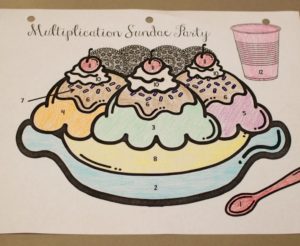
01 Dec Ice Cream Sundaes and Multiplication Facts
“Behavior charts and similar public shaming methods don’t teach self-regulation.
They mainly harm vulnerable learners.”
This quote from Educational Leadership hit me right in the gut. The feeling, that deep-rooted pang in my stomach that simultaneously breaks my heart and makes me feel physically sick, was/is a familiar one. It’s a feeling I get when I realize yet another harmful instructional practice for which I feel I owe mounds of apologies to past students.
Ugh.
Why didn’t I know then what I know now?
There is no place for shame, just action.
As Myra Angelo’s quote often reminds me, “Do the best you can until you know better. Then when you know better, do better.”
So now I know better and I’ve been reflecting on these public behavior and progress charts and I’d like to share my heart with you on them.
Ice cream scoops.
Star Charts
AR (Accelerated Reading) charts
Data Charts
Red, Yellow, Green Charts
You name them, I had them. I had behavior charts- aplenty, but I mostly had ‘competition’ charts. I thought they were inspiring and motivating. My ice cream scoops were infamous amongst incoming third graders. Every year in third grade I looked forward to having that end of year ice cream party where students received their hard-earned reward for passing their timed tests. ( I’m going to say those scoops were for passing a timed test, not for mastering their facts, as I now know there is a difference).
With each passed fact, I would add a scoop to the child’s bowl that was so proudly displayed on my bulletin board. We’d add whipped cream, bananas, syrup, etc. for each new passed test.

I’d encourage students and motivate them during timed tests, “You want more ice-cream, don’t you?”
Of course, they did.
All of them. Not just competitive ones. Not just the kids who had parents supporting them at home. Not just the kids who memorizing came easily to them. All of them. The ones who were disengaged during math class, the ones who lacked number sense, the ones you never turned in homework, and yes, even the ones who ‘acted’ as they could care less.
And yet, day in and day out, some kids continued to master their timed tests, and the same kids continued to struggle to get a single scoop. So, I’d cheer louder, encourage better, and pull them aside for extra flashcard practice.
Isn’t it Thomas Edison who wrote, “Doing the same thing over and over again and expecting different results is the definition of insanity?”
Why did I expect that on the 5th attempt at passing his 3’s, Edward would finally be motivated enough with ice cream to pass?
It wasn’t the ice cream that was the problem.
It wasn’t the motivation that was the problem.
It wasn’t the lack of parent support that was the problem.
It wasn’t the lack of responsibility for homework that was the problem.
It wasn’t a lack of grit, which I’ve come to learn is a harmful term for many of our students.
It was the system.
It was the pressure.
It was the focus on a timed test.
It was the emphasis only on timed tests and not on any other way to master the facts.
I never really put myself in his shoes. How demoralizing to see everyone’s bowls building sky-high with ice cream, wanting to pass, but day in and day out not passing. How embarrassing. I can only imagine the thoughts he told himself each day when again he didn’t pass.
Now I can see I was the culprit in adding to the test anxiety. I was a culprit in writing part of that child’s math story that he would always remember: Not being smart enough or fast enough to get another scoop of ice cream.
It wasn’t about trying harder. Some students were very motivated by the ice cream scoops and were good at memorizing. They felt good about themselves. But could I have accomplished the same goal with private data and goal-making? In hindsight, yes.
Seeing other people’s ice cream scoops, AR stars, etc. continue to grow while theirs did not seemingly define who they were as students—not good enough, smart enough, or fast enough. Is that the message I wanted to send?
Of course not. My intentions were pure. I really believed in my kids. I just lacked some of the knowledge, resources, and instructional practices to really help them get there. I did the best I could with what I knew.
I know I wanted to not only send the message of ‘You can do it!” I wanted students, all students, to have a growth mindset and to know they weren’t there yet, but they would be! But what happens when they weren’t?
Did they need the visual reminder day in and day out of how not up to ‘par’ they were?
Did every other child in that room need to know who was at the perceived bottom and who was at the perceived top?
Did I promote shame?
For my most vulnerable learners, was I helping or hurting?
Brene Brown, in her Daring Classrooms seminar, says,
“Teachers are the guardians of spaces that allow students to breathe and be curious and explore the world without suffocation.”
I truly believe all students CAN master their facts. I no longer believe the sole way of doing this is through memorization. But I do believe I was promoting memorization as the gatekeeper to math fact fluency and this was a harmful practice. This sort of memorization for the short-term goal of an ice cream scoop was a temporary fix to a much larger math fluency issue.
Did most know their facts for third grade? Yep, and I was proud. Did they keep that fact mastery come 4th and 5th grade? Honestly, I doubt it as most upper-grade teachers complained students didn’t have it. We must ask ourselves honestly, did they ever have it at all?
Did those kids memorize quickly, store the info in short term memory (high school flashbacks anyone?) just to take the test, pass, get an ice cream scoop and move to the next fact? I thought I was helping. I truly did have good intentions. I believe now I just needed to make a few tweaks to my plan and the first one is taking down those darn ice cream bowls.
No matter how great a child is at pretending he/she doesn’t care, I now know this to be a coping mechanism. What child wouldn’t care about being the only one with only one scoop of ice cream? It is easier to pretend that it doesn’t matter than to admit that it hurt deeply.
I have always believed in goal setting and goal getting. I just now believe it doesn’t need to be a competition with everyone else, nor does it need to be a public shaming event. Some kids thrive off this competition, and so I’d love for them to be rewarded for beating ‘themselves.’ The goal isn’t to be the best. The goal is to be THEIR BEST.
I read earlier this year a quote on twitter (my apologies for not having the source) but it basically said these behaviors are significantly damaging our classroom cultures and they likened it to posting teacher’s individual achievement scores in the staff lounge. How would that impact the culture of our staff?
For some, it would be motivating (most likely those already at the top)—fight, fight, fight! Rise to the top!
For many, it would be demoralizing and would pit teachers against each other.
Do we all need to improve? Yes.
Does data help us to improve? I believe yes.
Does it need to be public? I no longer believe yes.
Let’s celebrate meeting and surpassing our goals. The specifics aren’t important to the group unless the individual chooses to share the specifics.
I now know better and I plan to do better.
No shame. No guilt for the past. Only action for the future.
By no means am I finished learning on this topic. I’m honestly a bit overwhelmed with what I still don’t know. There are so many angles and arguments to make. I don’t want to shelter students from the world that is in and of itself competitive, but I must find ways to salvage their math identity and humanity in the process as well as preserve the classroom culture and make it a shame-free zone.
I’d love to hear your thoughts on this. What am I missing? What do we need to add to the conversation?


Barb McMahon
Posted at 19:19h, 02 DecemberSpot on dear!
skiebler
Posted at 02:37h, 05 Decemberxoxo
Td
Posted at 15:04h, 05 DecemberWhat is the best way to insure students know and can apply basic math facts? What strategies would you recommend?